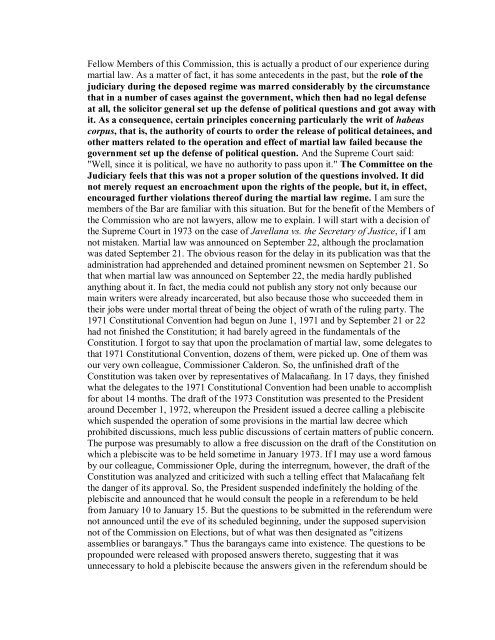Republic of the Philippines SUPREME COURT Manila ... - Columba.us
Republic of the Philippines SUPREME COURT Manila ... - Columba.us
Republic of the Philippines SUPREME COURT Manila ... - Columba.us
Create successful ePaper yourself
Turn your PDF publications into a flip-book with our unique Google optimized e-Paper software.
Fellow Members <strong>of</strong> this Commission, this is actually a product <strong>of</strong> our experience during<br />
martial law. As a matter <strong>of</strong> fact, it has some antecedents in <strong>the</strong> past, but <strong>the</strong> role <strong>of</strong> <strong>the</strong><br />
judiciary during <strong>the</strong> deposed regime was marred considerably by <strong>the</strong> circumstance<br />
that in a number <strong>of</strong> cases against <strong>the</strong> government, which <strong>the</strong>n had no legal defense<br />
at all, <strong>the</strong> solicitor general set up <strong>the</strong> defense <strong>of</strong> political questions and got away with<br />
it. As a consequence, certain principles concerning particularly <strong>the</strong> writ <strong>of</strong> habeas<br />
corp<strong>us</strong>, that is, <strong>the</strong> authority <strong>of</strong> courts to order <strong>the</strong> release <strong>of</strong> political detainees, and<br />
o<strong>the</strong>r matters related to <strong>the</strong> operation and effect <strong>of</strong> martial law failed beca<strong>us</strong>e <strong>the</strong><br />
government set up <strong>the</strong> defense <strong>of</strong> political question. And <strong>the</strong> Supreme Court said:<br />
"Well, since it is political, we have no authority to pass upon it." The Committee on <strong>the</strong><br />
Judiciary feels that this was not a proper solution <strong>of</strong> <strong>the</strong> questions involved. It did<br />
not merely request an encroachment upon <strong>the</strong> rights <strong>of</strong> <strong>the</strong> people, but it, in effect,<br />
encouraged fur<strong>the</strong>r violations <strong>the</strong>re<strong>of</strong> during <strong>the</strong> martial law regime. I am sure <strong>the</strong><br />
members <strong>of</strong> <strong>the</strong> Bar are familiar with this situation. But for <strong>the</strong> benefit <strong>of</strong> <strong>the</strong> Members <strong>of</strong><br />
<strong>the</strong> Commission who are not lawyers, allow me to explain. I will start with a decision <strong>of</strong><br />
<strong>the</strong> Supreme Court in 1973 on <strong>the</strong> case <strong>of</strong> Javellana vs. <strong>the</strong> Secretary <strong>of</strong> J<strong>us</strong>tice, if I am<br />
not mistaken. Martial law was announced on September 22, although <strong>the</strong> proclamation<br />
was dated September 21. The obvio<strong>us</strong> reason for <strong>the</strong> delay in its publication was that <strong>the</strong><br />
administration had apprehended and detained prominent newsmen on September 21. So<br />
that when martial law was announced on September 22, <strong>the</strong> media hardly published<br />
anything about it. In fact, <strong>the</strong> media could not publish any story not only beca<strong>us</strong>e our<br />
main writers were already incarcerated, but also beca<strong>us</strong>e those who succeeded <strong>the</strong>m in<br />
<strong>the</strong>ir jobs were under mortal threat <strong>of</strong> being <strong>the</strong> object <strong>of</strong> wrath <strong>of</strong> <strong>the</strong> ruling party. The<br />
1971 Constitutional Convention had begun on June 1, 1971 and by September 21 or 22<br />
had not finished <strong>the</strong> Constitution; it had barely agreed in <strong>the</strong> fundamentals <strong>of</strong> <strong>the</strong><br />
Constitution. I forgot to say that upon <strong>the</strong> proclamation <strong>of</strong> martial law, some delegates to<br />
that 1971 Constitutional Convention, dozens <strong>of</strong> <strong>the</strong>m, were picked up. One <strong>of</strong> <strong>the</strong>m was<br />
our very own colleague, Commissioner Calderon. So, <strong>the</strong> unfinished draft <strong>of</strong> <strong>the</strong><br />
Constitution was taken over by representatives <strong>of</strong> Malacañang. In 17 days, <strong>the</strong>y finished<br />
what <strong>the</strong> delegates to <strong>the</strong> 1971 Constitutional Convention had been unable to accomplish<br />
for about 14 months. The draft <strong>of</strong> <strong>the</strong> 1973 Constitution was presented to <strong>the</strong> President<br />
around December 1, 1972, whereupon <strong>the</strong> President issued a decree calling a plebiscite<br />
which s<strong>us</strong>pended <strong>the</strong> operation <strong>of</strong> some provisions in <strong>the</strong> martial law decree which<br />
prohibited disc<strong>us</strong>sions, much less public disc<strong>us</strong>sions <strong>of</strong> certain matters <strong>of</strong> public concern.<br />
The purpose was presumably to allow a free disc<strong>us</strong>sion on <strong>the</strong> draft <strong>of</strong> <strong>the</strong> Constitution on<br />
which a plebiscite was to be held sometime in January 1973. If I may <strong>us</strong>e a word famo<strong>us</strong><br />
by our colleague, Commissioner Ople, during <strong>the</strong> interregnum, however, <strong>the</strong> draft <strong>of</strong> <strong>the</strong><br />
Constitution was analyzed and criticized with such a telling effect that Malacañang felt<br />
<strong>the</strong> danger <strong>of</strong> its approval. So, <strong>the</strong> President s<strong>us</strong>pended indefinitely <strong>the</strong> holding <strong>of</strong> <strong>the</strong><br />
plebiscite and announced that he would consult <strong>the</strong> people in a referendum to be held<br />
from January 10 to January 15. But <strong>the</strong> questions to be submitted in <strong>the</strong> referendum were<br />
not announced until <strong>the</strong> eve <strong>of</strong> its scheduled beginning, under <strong>the</strong> supposed supervision<br />
not <strong>of</strong> <strong>the</strong> Commission on Elections, but <strong>of</strong> what was <strong>the</strong>n designated as "citizens<br />
assemblies or barangays." Th<strong>us</strong> <strong>the</strong> barangays came into existence. The questions to be<br />
propounded were released with proposed answers <strong>the</strong>reto, suggesting that it was<br />
unnecessary to hold a plebiscite beca<strong>us</strong>e <strong>the</strong> answers given in <strong>the</strong> referendum should be


